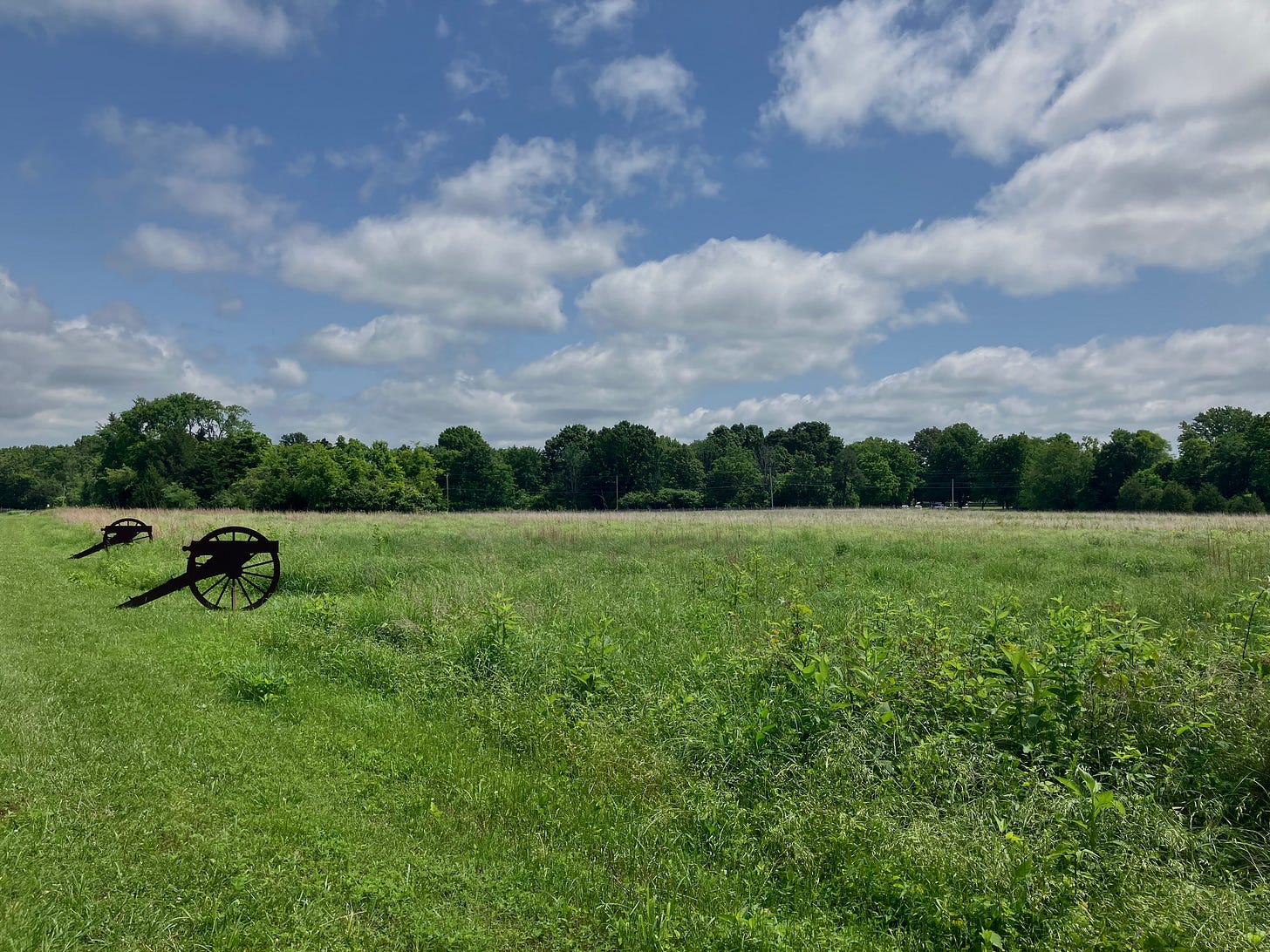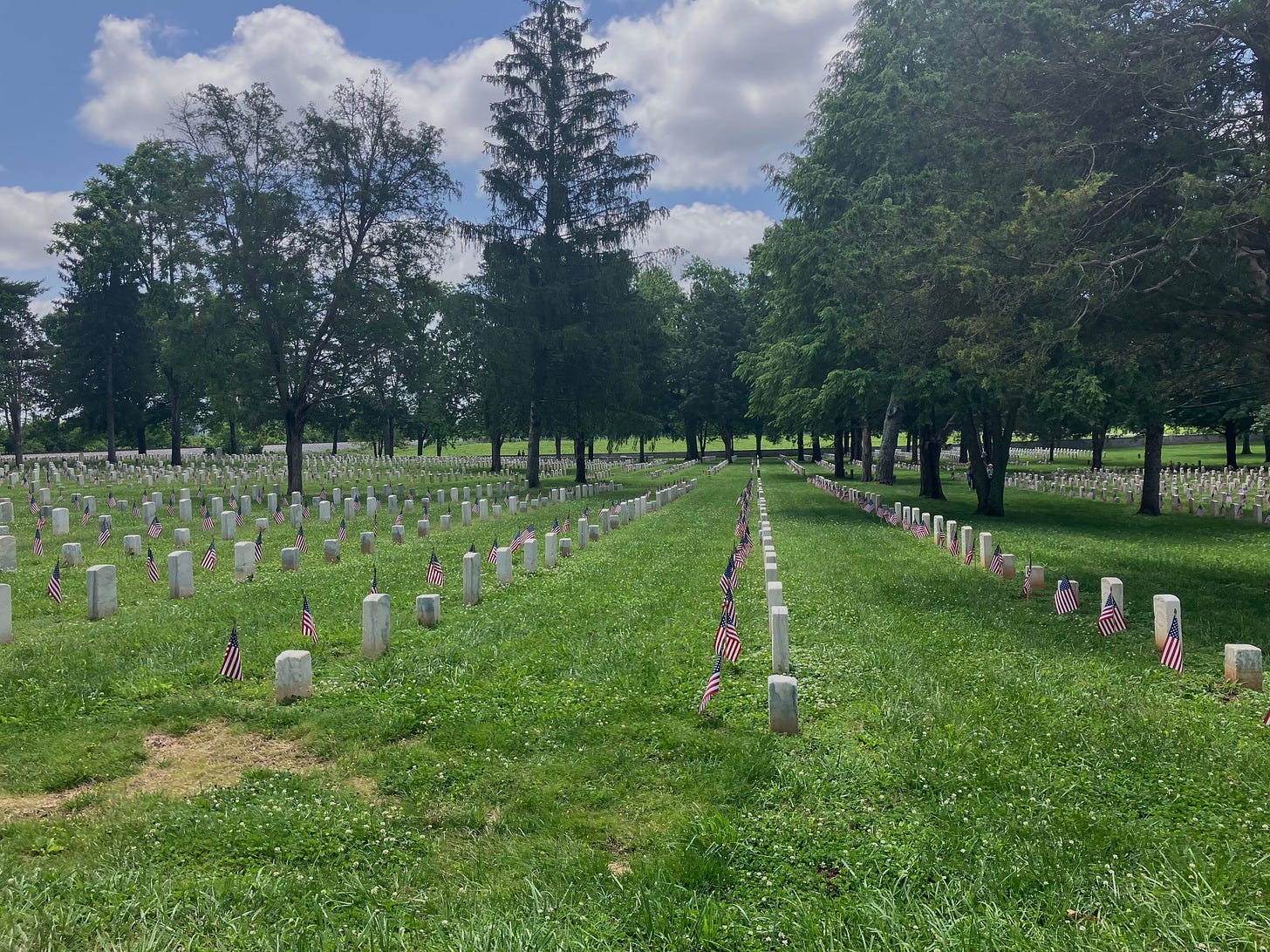Last Monday was Memorial Day and my wife and I took our two-year-old to the Stones River Battlefield.
It’s not a tradition of ours. We don’t spend Veterans Day or July 4th commemorating the victories of the United States and the sacrifices of the countrymen that preceded us. I guess it’s never felt like my story to tell.
I grew up going to the Civil War site, it’s gotten a major facelift in the last fifteen years or so with a shiny new National Park entrance and gift shop. The park has more traffic now than it ever has — last year attendance was over 200,000 — but the land has remained the same. Limestone, soft dirt underfoot, and craggy roots.
Walking the trail around the battlefield in the mid-eighty-degree late springtime, it’s hard to imagine the conflict that happened here in the winter over 150 years ago. Over 70,000 troops were gathered on opposite sides of the field — now recognized as a fragile ecosystem like the other cedar glades of the area — waiting for the first cannon to fire.
I don’t know what it means that several thousand Americans lost their lives in my hometown fighting for the right to keep slaves or the obligation to fulfill the promissory note of the Constitution. How do you appropriately reconcile that depth of conflict or the significance of the Northern conquest?
As we passed by the monument the state of Michigan erected to memorialize its fallen sons at the Stones River, I put the question to my wife, sick of feeling like I was teaching a history lesson.
“I don’t know,” she said. “But I think it’s unfair what we ask young men to do for our country.”
When we left, successfully avoiding toddler sunburn, I pulled into the cemetery where thousands of soldiers from the second battle of Murfreesboro and other battles in the Middle Tennessee area were buried. Arranged in tidy rows in alphabetical order lie hundreds of identical tombstones, each one with a small American flag placed in front — the only differences being the names etched on them.
The scale is hard to believe. Over 6100 soldiers were buried there shortly after the winter of 1863. 6100 men. 6100 young men just evaporated from the earth in hopes that their last breaths would mean something. Did they even consider their legacy? Union troops, all of them.
“I wonder where the Confederates were buried,” I said to my wife. ( They’re not particularly hidden I would later find out, they were buried in a mass grave in the center of town. )
It’s an ugly other half of the story I hadn’t been considering. An entire part of the plot that I wasn’t focused on — and neither was the National Park Service.
They were telling a different story — one of heroism, valor, and sacrifice. One that makes sense.
As Joan Didion has said, we tell ourselves stories in order to live. I’m not the first nor the most intelligent to echo that sentiment. American psychologist, Jerome Brumer, asserted as much with his empirical research of narrative psychology. We construct reality from a preexisting narrative framework, not the other way around. We don’t just tell stories in order to live, our stories tell us who we are.
How else would one cope with the random cruelty or the inexplicable divinity of the human experience? If no narrative exists, then neither do the remains of the bodies buried near the train tracks in my nondescript Southern suburban town. If, however, you entertain the idea that these poor souls were acting in the service of a greater good, of God — then that’s a story worth telling.
Americans are too detached from the greatness of our deeds. Since Vietnam, we’ve been on a rather dishonorable losing streak in the world and it shows. In a way, it’s a shame that World War II wasn’t fought in the States. If Americans were confronted with the depth of loss and the solemnity of victory ( both moral and literal ) maybe public sentiment in this country would be different.
Earlier this year, I was watching the Liege-Bastogne-Liege, one of the greatest one-day cycling events in the world. Outside of Bastogne, thanks to the camera crew operating from the helicopter, you could see the monument that was built to honor the Americans who lost their lives at the Battle of the Bulge, the bloodiest battle fought by American forces in all of World War II.
The commentators, Bob Roll and Christian Vandevelde ( both Americans ) were getting emotional as they recounted learning about the history of the Ardennes and the significance and scale of the Allied victory in the region. From a studio in the States, both ex-professional cyclists who’d spent their whole careers in Europe, were fighting to maintain their composure while they spoke about the importance of that area. Because they understood, viscerally and intellectually, what had taken place at that hallowed ground.
Never have Americans been so disconnected from their history. The existential crisis we’re enduring as a nation is one of identity, and I can’t help but think that even a cursory history lesson would help address some of those questions.
The recapitulation of the Civil War as a reprehensible event instead of the noblest of causes may put it out of reach for these purposes, but the stories of World War II and the Greatest Generation are still within grasp — but just barely. We ought to be constantly talking about the reality of these wars. If visiting a literal gravesite wasn’t enough to help me conceptualize the army of men who sacrificed their lives in the name of liberation then how am I supposed to contend with the 10,000 dead on the beaches of Normandy or the 80,000 in Belgium?
The 80th Anniversary of D-Day, the Allied Forces invasion of France, was yesterday. I spent the day reading and listening to accounts of what the events of the day were actually like. I already had the bird’s eye view, and we’ve all seen footage of infantrymen hurling themselves on the beaches of northern France mowed down by machine gun fire.
I listened to the story of Jerry Markham, a member of the US Navy Combat Demolition Unit, and what he saw on D-Day. Markham and his team were tasked with detonating the mines with which the Germans had booby-trapped the beach.
Some ordinances were underwater while others were exposed at the high-tide mark. Due to the strong winds and the German’s heavy machine gun fire, the plan had to be abandoned immediately. Markham’s officer was killed the moment they approached the point where they were to disembark so the men were left to their own devices.
Over the next four hours, Markham and his team were able to detonate five of the obstacles that the Germans had constructed — only a small fraction of their goal. Ultimately, however, that would prove to be enough for the Americans to establish a beachhead from which the battle would eventually be won. The role that this small team of less than a hundred individuals played in liberating Europe is incalculable, but there is still something more remarkable about them. They were all volunteers — all of whom, due to their skillset back home, were exempt from the draft.
The demo unit would lose over 50% of its men that day in service of victory. John Talton, another member of the team, found himself all over the beaches over the next 48 hours due to scuppered plans and less-than-desirable circumstances said of every fallen American he saw on that cold beach that “they were all facing Germany.” Not one of them was retreating.
Markham said that every man who was at Normandy was a hero and I’m inclined to believe him.
I never met my mom’s dad. He wasn’t at D-Day but like Markham and Talton, was a volunteer. He joined the Navy at 16, one year after Pearl Harbor, and was sent to the Pacific. I don’t think I’ve spent enough time thinking about that nor have I devoted enough time in this article to the man my mother admired and is sure would be proud of his grandson — to the man who now shares a name with my daughter.
I still don’t know what it all means or if the lives we’re living now are worthy of the pain and suffering that were endured to get us to this point, but I realize I had already made a decision.
Taking our daughter to the park on Monday wasn’t because it was sunny outside or because we’d taken the day off, it was because we were introducing a new narrative. The stories of the boys from Ohio and Michigan who died so far South, the stories of Markham and Talton, and of my Grandpa Mobley are mine to tell. And, now, they’re hers, too.
To a better next week,
Cheers,
~FDA






It's sad that I missed the chance, or wasn't mature enough to take the chance, to learn more about my father's time during WWII. I think like most Veteran's my Dad never talked about the war. Not once do I remember him bringing it up. When he was with his buddies from the war, they only chose to talk about their time with each other and how they watched over each other. I cannot imagine having you go to war at the age of 16. My grandmother must have been so sad. I do KNOW that my Dad would have been so proud of you and that sweet, little girl who shares his name.